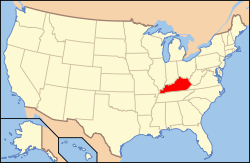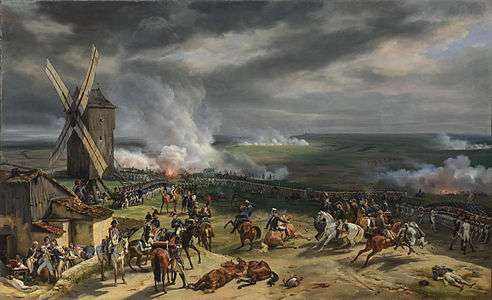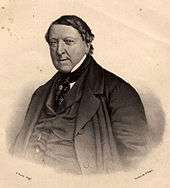1792
This article is about the year 1792. For the bourbon whiskey, see 1792 Ridgemont Reserve.
| Millennium: | 2nd millennium |
|---|---|
| Centuries: | 17th century · 18th century · 19th century |
| Decades: | 1760s · 1770s · 1780s · 1790s · 1800s · 1810s · 1820s |
| Years: | 1789 · 1790 · 1791 · 1792 · 1793 · 1794 · 1795 |
| 1792 by topic: | |
| Arts and Sciences | |
| Archaeology – Architecture – Art – Literature (Poetry) – Music – Science | |
| Countries | |
| Australia – Canada –Denmark – France – Great Britain – Ireland – Norway – Russia – Scotland –Sweden – United States | |
| Lists of leaders | |
| Colonial governors – State leaders | |
| Birth and death categories | |
| Births – Deaths | |
| Establishments and disestablishments categories | |
| Establishments – Disestablishments | |
| Works category | |
| Works | |
| Gregorian calendar | 1792 MDCCXCII |
| Ab urbe condita | 2545 |
| Armenian calendar | 1241 ԹՎ ՌՄԽԱ |
| Assyrian calendar | 6542 |
| Bengali calendar | 1199 |
| Berber calendar | 2742 |
| British Regnal year | 32 Geo. 3 – 33 Geo. 3 |
| Buddhist calendar | 2336 |
| Burmese calendar | 1154 |
| Byzantine calendar | 7300–7301 |
| Chinese calendar | 辛亥年 (Metal Pig) 4488 or 4428 — to — 壬子年 (Water Rat) 4489 or 4429 |
| Coptic calendar | 1508–1509 |
| Discordian calendar | 2958 |
| Ethiopian calendar | 1784–1785 |
| Hebrew calendar | 5552–5553 |
| Hindu calendars | |
| - Vikram Samvat | 1848–1849 |
| - Shaka Samvat | 1713–1714 |
| - Kali Yuga | 4892–4893 |
| Holocene calendar | 11792 |
| Igbo calendar | 792–793 |
| Iranian calendar | 1170–1171 |
| Islamic calendar | 1206–1207 |
| Japanese calendar | Kansei 4 (寛政4年) |
| Javanese calendar | 1718–1719 |
| Julian calendar | Gregorian minus 11 days |
| Korean calendar | 4125 |
| Minguo calendar | 120 before ROC 民前120年 |
| Nanakshahi calendar | 324 |
| Thai solar calendar | 2334–2335 |
| Wikimedia Commons has media related to 1792. |
1792 (MDCCXCII) was a leap year starting on Sunday (dominical letter AG) of the Gregorian calendar and a leap year starting on Thursday (dominical letter DC) of the Julian calendar, the 1792nd year of the Common Era (CE) and Anno Domini (AD) designations, the 792nd year of the 2nd millennium, the 92nd year of the 18th century, and the 3rd year of the 1790s decade. As of the start of 1792, the Gregorian calendar was 11 days ahead of the Julian calendar, which remained in localized use until 1918.
Events
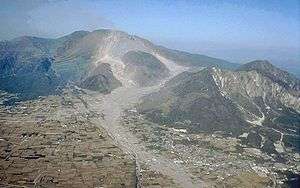
May 21: Mount Unzen (Japan) erupts.
January–March
- January 9 – The Treaty of Jassy ends the Russian Empire's war with the Ottoman Empire over Crimea.[1]
- February 20 – The Postal Service Act, establishing the United States Post Office Department, is signed by President George Washington.
- March 1 – Francis II, Holy Roman Emperor, the last emperor, takes office.
- March 16 – King Gustav III of Sweden is shot in the back by Jacob Johan Anckarström at a midnight masquerade at the Royal Opera in Stockholm; he lives until March 29, and is then succeeded by his son Gustav IV Adolf.
- March 20 – A new capital of North Carolina and county seat of the newly formed Wake County is established after North Carolina State Senator and surveyor William Christmas submits his design for the city. A few months later the capital is officially named Raleigh in honor of Sir Walter Raleigh.
April–June
- April 2 – The Coinage Act is passed, establishing the United States Mint.
- April 5 – United States President George Washington vetoes a bill designed to apportion representatives among U.S. states. This is the first time the presidential veto is used in the United States.
- April 20 – France declares war against Austria, beginning the French Revolutionary Wars.
- April 21 – Tiradentes, prime figure in the Inconfidência Mineira plot, is executed in Rio de Janeiro, Brazil.
- April 25
- Highwayman Nicolas Pelletier becomes the first person executed by guillotine in France.
- La Marseillaise, the French national anthem, is composed by Claude Joseph Rouget de Lisle.
- May 11 – Robert Gray's Columbia River expedition: Captain Robert Gray on the Columbia Rediviva becomes the first white man to enter the Columbia River.
- May 17 – The Buttonwood Agreement is signed, beginning the New York Stock Exchange.
- May 18 – War in Defence of the Constitution: Russia invades Poland.
- May 21 – An old lava dome collapses in Kyūshū, Japan when Mount Unzen volcano erupts; the resulting avalanche and tsunami kills about 14,300 people.
- June 1 – Kentucky becomes the 15th state of the United States of America.
- June 4 – Captain George Vancouver claims Puget Sound for Great Britain.
- June 13
- Vancouver becomes the first European to enter Burrard Inlet.
- Prussia declares war against France.
July–September
- July 18 – Polish–Russian War: At the Battle of Dubienka, soldiers of the Polish–Lithuanian Commonwealth led by Tadeusz Kościuszko resist an attack from Imperial Russian Army forces five times their size.
- August 10 – French Revolution: The Tuileries Palace is stormed, and Louis XVI of France is arrested and taken into custody.
- September – Macartney Embassy: George Macartney, 1st Earl Macartney, sails from Portsmouth in HMS Lion as the first official envoy from the Great Britain to China.
- September 2–7 – French Revolution: During what become known as the September Massacres, rampaging mobs slaughter three Roman Catholic bishops and more than 200 priests, together with at least a thousand criminals.
- September 11 – Six men steal some of the former French Crown Jewels from a warehouse where the revolutionary government had stored them.
- September 14 – Thomas Paine flees from England to France after being indicted for treason. He is tried in absentia during December and outlawed.[2]
- September 20 – Battle of Valmy: The French revolutionary army defeats Prussians under the Duke of Brunswick after a 7-hour artillery duel.
- September 21 – Proclamation of the abolition of the monarchy by the French Convention and establishment of the French First Republic with effect from the following day.
- September 22 – The Era of the historical French Republican Calendar begins.
October–December
- October 12 – The first Columbus Day celebration in the United States is held in New York City, 300 years after his arrival in the New World.
- October 13 – Foundation of Washington, D.C.: The cornerstone of the United States Executive Mansion, known as the White House after 1818, is laid.
- October 29 – Mount Hood (Oregon) is named after the British Admiral Lord Hood by Lt. William Broughton of the Vancouver Expedition, who spots the mountain near the mouth of the Willamette River.
- December 3 – George Washington is re-elected President of the United States.
- December 26 – The trial of Louis XVI of France begins.

October 13: Washington, D.C. founded.
Date unknown
- The Baptist Missionary Society is founded in Kettering, England.
- Tipu Sultan invades Kerala in India, but is repulsed.
- Franz Xaver von Zach, an astronomer, publishes The Tables of the Sun, an essential early work for navigation.
- Claude Chappe successfully demonstrates the first semaphore line, between Paris and Lille.
- William Murdoch begins experimenting with gas lighting.
- George Anschutz constructs the first blast furnace in Pittsburgh.
- Thomas Holcroft produces the play Road to Ruin in London.
- Barthélemy Catherine Joubert, later general, becomes sub-lieutenant.
- Johann Georg Albrechtsberger becomes Kapellmeister in Vienna.
- The State Street Corporation is founded.
- Shiloh Meeting House, predecessor of Shiloh United Methodist Church in Lynchburg, Virginia, is founded.
- Mary Wollstonecraft's A Vindication of the Rights of Woman is published.
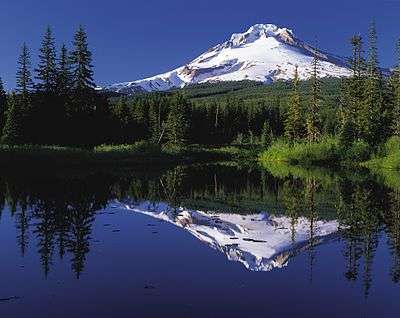
October 29: Mount Hood is named.
- The first written examinations in Europe are held at Cambridge University, England.
- Denmark is the first country in the world to outlaw slavery.
Births
January–June
- January 12 – Johann Arfvedson, Swedish chemist (d. 1841)
- February 10 – Captain Frederick Marryat, British author (d. 1848)
- February 15 – Floride Calhoun, Second Lady of the United States (d. 1866)
- February 17 – Karl Ernst von Baer, German naturalist (d. 1876)
- February 29 – Gioachino Rossini, Italian composer (d. 1868)
- March 3 – Johann Karl Ludwig Gieseler, German church historian (d. 1854)
- March 4 – Samuel Slocum, American inventor (d. 1861)
- March 7 – John Herschel, English mathematician and astronomer (d. 1871)
- April 1 – Karl Gottlob Zumpt, German scholar (d. 1849)
- April 4 – Thaddeus Stevens, American politician (d. 1868)
- April 23 – Thomas Romney Robinson, Irish astronomer and physicist (d. 1882)
- April 25 – John Keble, English churchman and poet (d. 1866)
- May 10 – Willie Person Mangum, American politician (d. 1861)
- May 13 – Pope Pius IX, born Giovanni Mastai-Ferretti, Italian churchman (d. 1878)
- May 15 – James Mayer de Rothschild, German-born banker (d. 1868)
- May 17 – Anne Isabella Milbanke, English wife of Lord Byron (d. 1860)
- May 18 – Margaret Ann Neve, Guernesiaise supercentenarian (d. 1903)
- May 21 – Gaspard-Gustave Coriolis, French engineer and scientist (d. 1843)
- June 13 – William Austin Burt American inventor "Father of the typewriter (d. 1858)
- June 15 – John Pascoe Fawkner, pioneer and newspaper publisher in Melbourne, Victoria, Australia (d. 1869)
- June 16 – John Linnell, English painter (d. 1882)
July–December
- July 7 – William Henry Smith, British businessman (d. 1865)
- July 10 – George M. Dallas, U.S. Senator and 11th Vice President of the United States (d. 1864)
- June 21 – Ferdinand Christian Baur, German theologian (d. 1860)
- August 4 – Percy Bysshe Shelley, English poet (d. 1822)
- August 13 – Adelaide of Saxe-Meiningen, queen of William IV of the United Kingdom (d. 1849)
- August 18 – John Russell, 1st Earl Russell, Prime Minister of the United Kingdom (d. 1878)
- September 19 – William Backhouse Astor, Sr., American business tycoon (d. 1875)
- September 26 – William Hobson, first Governor of New Zealand (d. 1842)
- October 29 – Thomas Livingstone Mitchell, explorer and Surveyor-General of New South Wales, Australia (d. 1855)
- November 4 – Carlos Antonio López, president of Paraguay (d. 1862)
- November 10 – Samuel Nelson, Associate Justice of the Supreme Court of the United States (d. 1873)
- November 11 – Mary Anne Evans, wife of Benjamin Disraeli (d. 1872)
- November 28 – Victor Cousin, French philosopher (d. 1867)
- December 1 – Nikolai Lobachevsky, Russian mathematician (d. 1856)
- December 6 – William II of the Netherlands (d. 1849)
date unknown
- Matteo Carcassi, Italian musician and composer (d. 1853)
- Maria Quitéria, Brazilian national heroine (d. 1853)
- Nodira, Uzbek poet and stateswoman (d. 1842)
Deaths
January–June
- February 15 – John Witherspoon, signer of the Declaration of Independence (b. 1723)
- February 23 – Sir Joshua Reynolds, British painter (b. 1723)
- March 1 – Leopold II, Holy Roman Emperor (b. 1747)
- March 3 – Robert Adam, British architect (b. 1728)
- March 10 – John Stuart, 3rd Earl of Bute, Prime Minister of the United Kingdom (b. 1713)
- March 29 – King Gustav III of Sweden (assassinated) (b. 1746)
- April 3 – George Pocock, British admiral (b. 1706)
- April 4 – James Sykes, American politician (b. 1725)
- April 14 – Maximilian Hell, Slovakian astronomer (b. 1720)
- April 23 – Karl Friedrich Bahrdt, German theologian and adventurer (b. 1741)
- April 30 – John Montagu, 4th Earl of Sandwich, English statesman (b. 1718)
- May 10 – John Stevens, American delegate to the Continental Congress
- May 12 – Charles Simon Favart, French dramatist (b. 1710)
- May 24 – George Brydges Rodney, 1st Baron Rodney, British naval officer (b. 1718)
- June 4 – John Burgoyne, British general (b. 1723)
- June 22 – Muhammad ibn Abd al-Wahhab, Arabic preacher (b. 1703)
July–December
- July 3 – Duke Ferdinand of Brunswick-Wolfenbüttel (b. 1721)
- July 18 – John Paul Jones, American naval captain (b. 1747)
- July 29 – René Nicolas Charles Augustin de Maupeou, Chancellor of France (b. 1714)
- August 5 – Frederick North, Lord North, Prime Minister of the United Kingdom (b. 1732)
- August 25 – Jacques Cazotte, French writer (b. 1719)
- September 3 – Marie-Louise, princesse de Lamballe, French princess, friend of Marie Antoinette (murdered during the French Revolution) (b. 1749)
- September 8 – Charles d'Abancour, French statesman (b. 1758)
- September 18 – August Gottlieb Spangenberg, German religious leader (b. 1704)
- September 25 – Adam Gottlob Moltke, Danish statesman (b. 1710)
- September 29 – George Browne, Russian-Irish field-marshal (b. 1698)
- October 7 – George Mason, American patriot (b. 1725)
- October 14 – Sophie Charlotte Ackermann, German actress (b. 1714)
- October 22 – Guillaume Le Gentil, French astronomer (b. 1725)
- October 28
- Paul Möhring, German physician and scientist (b. 1710)
- John Smeaton, English civil engineer (b. 1724)
- December 8 – Henry Laurens, political leader during the American Revolutionary War, father of John Laurens (b. 1724)
- December 15 – Joseph Martin Kraus, Swedish composer (b. 1756)
References
- ↑ "Historical Events for Year 1792 | OnThisDay.com". Historyorb.com. Retrieved 2016-07-14.
- ↑ Palmer, Alan; Veronica (1992). The Chronology of British History. London: Century Ltd. pp. 232–233. ISBN 978-0-7126-5616-0.
This article is issued from Wikipedia - version of the 11/22/2016. The text is available under the Creative Commons Attribution/Share Alike but additional terms may apply for the media files.
